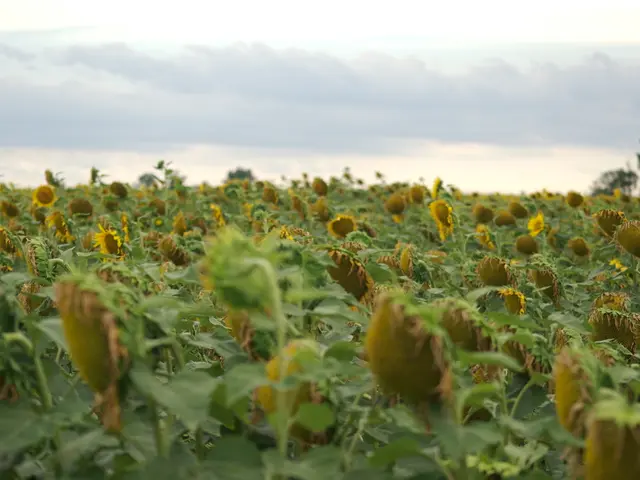Urban Farming Advocate Christopher Leow Emphasizes Importance: Freestyle Approach to City Agriculture
Chatting with Urban Farmer Chris Leow: A Singapore Success Story
Meet Chris Leow, the Singaporean urban farmer with an impressive journey. From aerospace engineering grad to Navy diver, barista, chef, cafe owner, and ultimately, an expert voice in urban agriculture, Chris has made his mark.
The former head of greens and general manager at Edible Garden City has led groundbreaking projects like the world's highest rooftop farm, the 1-Arden Food Forest, and the insect farming venture Future Protein Solutions. Initially, opportunities in urban farming were limited, but Chris's dedication transformed the landscape.
World Inspiration and Homegrown Beginnings
When opportunities were scarce in Singapore, Chris traveled the world with the Worldwide Opportunities on Organic Farms (WWOOF) program. Engaging in various agricultural endeavors, he found inspiration during his stay in Australia practicing permaculture and growing all his food with a family living off-grid. After his abroad journey, Chris returned home and delved into Singapore's growing urban agriculture scene.
Involved with community initiatives like Edible Garden City and ComCrop, Chris started his farming journey while juggling other jobs like being a chef, ramen consultant, and starting a coffee cart business to make ends meet. It wasn't until Bjorn Low, founder of Edible Garden City, approached Chris to build the country's first closed-loop farm - Citizen Farm - that Chris found the breakthrough he'd been waiting for, marking the start of his career as an urban farmer.
A Singapore Story
Singapore's interest in urban farming has skyrocketed as the city-state embarks on a mission to embrace city-based agriculture, particularly in the wake of the COVID-19 pandemic and the food supply chain challenges it posed. This shift is an essential aspect of the government's Green Plan 2030, aiming to address food security as Singapore relies heavily on imported food due to its small size.
The Green Plan 2030 sets a goal to unlock unused urban areas for farm production, including rooftops, carparks, and disused buildings, bolstered by increased investment in agri-food production technologies, research, education, and the Agri-food Cluster Transformation (ACT) Fund. Chris emphasizes the vibrant growth in the local urban farming movement, not just coming from government agencies but also from grassroots efforts like community gardens and schools adopting educational programs to teach children about local food production.
Rooftop Revolution
Christopher Leow's knowledge has helped convert numerous rooftops into edible gardens, even in unexpected places. One hospital farm is reported to grow 10% of its leafy vegetables. However, retrofitting structures for farming can be a complex endeavor, considering the buildings' unsuitability for various farming systems and the need for regulatory compliance.
Despite the challenges, there is growing enthusiasm for urban farming among decision-makers who recognize its manifold benefits, especially in supporting elderly care programs by providing social interaction and physical activity.
Educating Future Urban Farmers
The educational landscape in Singapore is transforming, with secondary schools incorporating on-campus agriculture programs into their sustainability plans and offering visits to urban farms. Chris has been instrumental in helping these schools set up their farm programs, teaching food culture, composting, irrigation, and growing everything from scratch.
Ample financial mechanisms, such as the SG Eco Fund, facilitate this shift towards normalizing farming for the population. Chris notes that teenagers were previously disinterested in farming, but urban agriculture in schools and communities is helping change perceptions.
Cultivating Change
Singapore's "30 by 30" initiative aimed to fulfill 30% of the nation's nutritional needs through locally produced food by 2030. However, the venture has failed to reach its target, largely due to the government's focus on high-technology farming methods and price-sensitive consumers who are unwilling to pay higher prices for locally grown produce.
In the face of these setbacks, Chris continues to champion home gardening and community farming to raise awareness about the true cost of food. Despite helming multiple farming projects, Chris hasn't forgotten his roots – he operates a volunteer community garden in his neighborhood, Nutopia, to share his knowledge with others eager to learn.
The Resilient Farmer: Overcoming Challenges
Resilience has been the key to Chris's success, enabling him to persevere through disappointments like the demise of Future Protein Solutions when investors had to withdraw after regulatory delays from the Singapore Food Authority. The approval for insects for human consumption finally came in summer 2024, but by that time, Chris had already shifted his focus to a new venture, The Freestyle Farmer, to provide urban agriculture coaching for those eager to start growing their own food.
The Freestyle Farmer: Bridging the Gap
The Freestyle Farmer addresses the knowledge gap that often hinders the success of urban farming projects. Chris's coaching tackles every aspect of grow-your-own urban farming, from building planters, assessing soil types, and understanding irrigation methods to utilizing professional agronomy tools and strategies to enhance crop growth. The personalized coaching program empowers urban farmers with the knowledge and confidence to establish and maintain thriving edible gardens on their own terms, fostering a greater sense of collaboration between growers and consumers.
Sharing Knowledge: Chris Leow, TV Show Host
Chris's extensive urban farming expertise has earned him recognition in the media. He currently hosts a documentary on Channel News Asia called "Growing Wild," exploring sustainable, holistic food growing practices around the globe, in addition to giving guest talks about urban farming's impact and the importance of good governance in a healthy food system.
Remaining modest and focused on the journey ahead, Chris continues to share his knowledge and inspire others to join the urban farming movement.
- Chris Leow, an expert in environmental science and lifestyle, showcases his transformation from an aerospace engineer to an urban farmer, having ventured into health-and-wellness sectors like fitness-and-exercise, food-and-drink, and home-and-garden.
- Urban farming, a key player in the environmental-science field, is gaining traction in Singapore due to the city-state's focus on city-based agriculture, driven by general-news events like the COVID-19 pandemic and the need for food security.
- Chris Leow's influence extends to education-and-self-development, with his contributions to Singapore's schools extracurricular programs that focus on food culture, composting, irrigation, and local food production.
- The world of science witnesses Chris Leow's rooftop revolutions that convert unused buildings into edible gardens and contribute to reducing climate-change impacts.
- In the realm of communication, Chris Leow shares his urban farming knowledge as a TV show host on "Growing Wild" and a public speaker, advocating for sustainable practices in food systems and supporting the growth of the urban farming movement.







